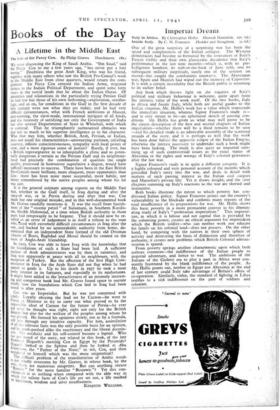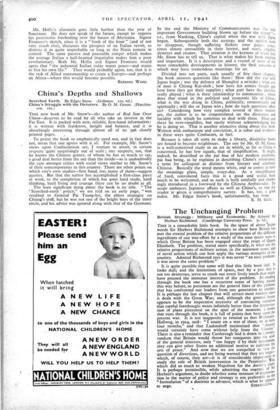Imperial Dream
Ow E of the great surprises of a surprising war has been the speed and completeness of the Italian collapse. The Western democracies had become so %bemused by the assurances of Italy's Fascist virility and their own plutocratic decadence that Italy's performance in the last nine months—which is, with its pre- belligerent bombast, its stab-m-the-back of June loth, and its subsequent military ineptitude, surely one of the sorriest on record—has caught the combatants unawares. The Abyssinian war, Spain and Munich had wiped out the memory of Caporetto. It is with a certain incredulity that the British public is returning to its earlier belief.
Any book which throws light on the vagaries of Italy's political and military behaviour is welcome quite apart from the intrinsic value of the work itself. Of the two books, Italy in Africa and Inside Italy, while both are useful guides to the Italian situation, Mr. Hollis's work has a value which transcends the immediate situation, whereas Signor Franzero's study is— and is only meant to be—an ephemeral sketch of passing con- ditions. Mr. Hollis has given us what may well prove to be the classic description of the first and second chapters of Italian imperialism—whether there will be a third remains to be seen —and his detailed study is an admirable assembly of the scattered strands of the story, and it is perhaps as Well that the work has been done before the appal ear eclipse of the Italian Empire, otherwise the interest necessary to undertake such a book might have been lacking. The study is also quite an impartial sum- ming up of such controversial issues as the exact status of Abyssinia or the rights and wrongs of Italy's colonial grievances after the last war.
Signor Franzero's study is in quite a different category. It is a highly coloured and very personal account of the months which preceded Italy's entry into the war, and deals in detail with matters of such passing interest as the Italian coal cargoes and Mussolini's private life: Yet it shows insight, and the later chapters summing up Italy's reactions to the war are shrewd and instructive.
Both books illustrate the extent to which poverty has con- ditioned Italian policy. Signor Franzero points out the country's vulnerability to the blockade and confirms many reports of the total insufficiency of its preparations for war. Mr. Hollis shows this basic poverty in a more permanent context in his illtunin- ating study of Italy's "proletarian imperialism." This imperial- ism, in which it is labour and not capital that is provided by the colonising power, creates an ethical argument for imperiaism which the British soldier—who can neither work nor educate his family on his colonial land—does not possess. On the other hand, by competing with the natives in their own sphere of activity and destroying the basis of distinction and therefore of authority, it creates new problems which British Colonial admini- stration is spared. From poverty springs another characteristic upon which both authors comment—the indifference of the Italian people to imperial adventure, and hence to war. The ambitions of the Italians of the Gioletti era to play a part in Africa were con- stantly frustrated by the blank indifference of the people. As Mr. Hollis points out, neither in Egypt nor Abyssinia at the end of last century could Italy take advantage of Britain's offers of co-operation. Similarly, today, the standard of fighting in Libya testifies to a sick indifference on the part of soldiers and colonists. Mr. Hollis's chronicle goes little further than the year of Sanctions. He does not speak of the future, except to express his pessimistic foreboding over the future of Abyssinia. Signor Franzero's sketch, since it is a "book of the hour" (and of not very much else), discusses the prospect of an Italian revolt, to dismiss it as quite improbable so long as the Nazis remain in control. The same passive and peaceable temper which makes the averagg Italian a half-hearted imperialist makes him a poor revolutionary. Both Mr. Hollis and Signor Franzero would agree that "the industrial Italian today wants peace—and wants to live his own life." They would probably agree, too, that it is the task of Allied statesmanship to create a Europe—and perhaps an Africa—where this would become possible.
BARBARA WARD.































 Previous page
Previous page